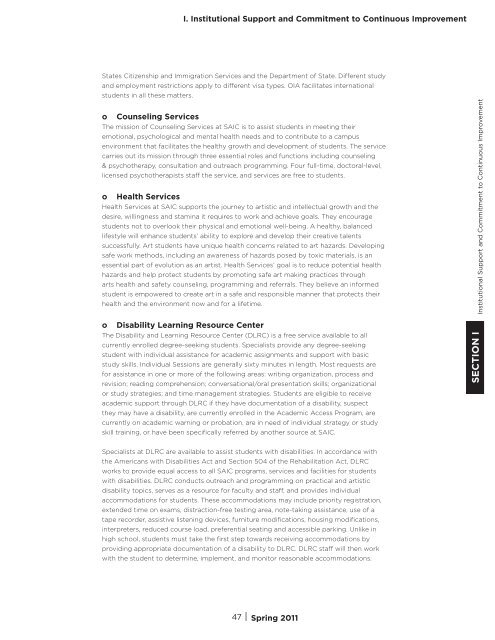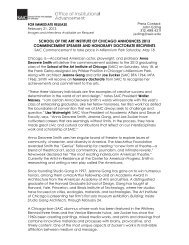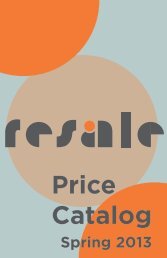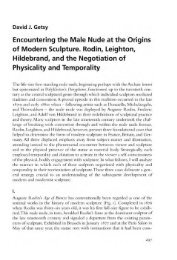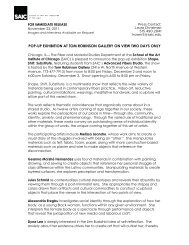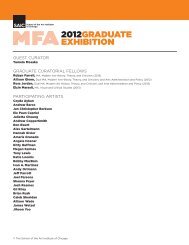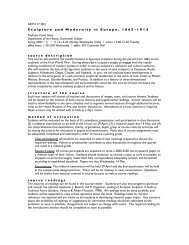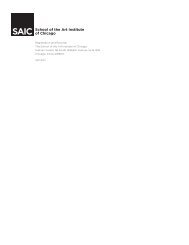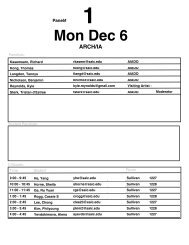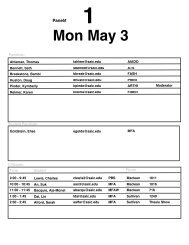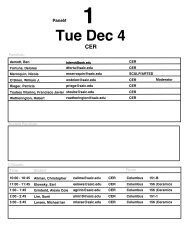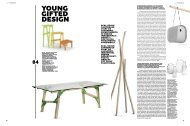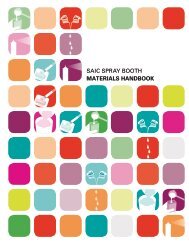i. institutional support and commitment to continuous improvement
i. institutional support and commitment to continuous improvement
i. institutional support and commitment to continuous improvement
Create successful ePaper yourself
Turn your PDF publications into a flip-book with our unique Google optimized e-Paper software.
I. Institutional Support <strong>and</strong> Commitment <strong>to</strong> Continuous Improvement<br />
States Citizenship <strong>and</strong> Immigration Services <strong>and</strong> the Department of State. Different study<br />
<strong>and</strong> employment restrictions apply <strong>to</strong> different visa types. OIA facilitates international<br />
students in all these matters.<br />
o Counseling Services<br />
The mission of Counseling Services at SAIC is <strong>to</strong> assist students in meeting their<br />
emotional, psychological <strong>and</strong> mental health needs <strong>and</strong> <strong>to</strong> contribute <strong>to</strong> a campus<br />
environment that facilitates the healthy growth <strong>and</strong> development of students. The service<br />
carries out its mission through three essential roles <strong>and</strong> functions including counseling<br />
& psychotherapy, consultation <strong>and</strong> outreach programming. Four full-time, doc<strong>to</strong>ral-level,<br />
licensed psychotherapists staff the service, <strong>and</strong> services are free <strong>to</strong> students.<br />
o Health Services<br />
Health Services at SAIC <strong>support</strong>s the journey <strong>to</strong> artistic <strong>and</strong> intellectual growth <strong>and</strong> the<br />
desire, willingness <strong>and</strong> stamina it requires <strong>to</strong> work <strong>and</strong> achieve goals. They encourage<br />
students not <strong>to</strong> overlook their physical <strong>and</strong> emotional well-being. A healthy, balanced<br />
lifestyle will enhance students’ ability <strong>to</strong> explore <strong>and</strong> develop their creative talents<br />
successfully. Art students have unique health concerns related <strong>to</strong> art hazards. Developing<br />
safe work methods, including an awareness of hazards posed by <strong>to</strong>xic materials, is an<br />
essential part of evolution as an artist. Health Services’ goal is <strong>to</strong> reduce potential health<br />
hazards <strong>and</strong> help protect students by promoting safe art making practices through<br />
arts health <strong>and</strong> safety counseling, programming <strong>and</strong> referrals. They believe an informed<br />
student is empowered <strong>to</strong> create art in a safe <strong>and</strong> responsible manner that protects their<br />
health <strong>and</strong> the environment now <strong>and</strong> for a lifetime.<br />
o Disability Learning Resource Center<br />
The Disability <strong>and</strong> Learning Resource Center (DLRC) is a free service available <strong>to</strong> all<br />
currently enrolled degree-seeking students. Specialists provide any degree-seeking<br />
student with individual assistance for academic assignments <strong>and</strong> <strong>support</strong> with basic<br />
study skills. Individual Sessions are generally sixty minutes in length. Most requests are<br />
for assistance in one or more of the following areas: writing organization, process <strong>and</strong><br />
revision; reading comprehension; conversational/oral presentation skills; organizational<br />
or study strategies; <strong>and</strong> time management strategies. Students are eligible <strong>to</strong> receive<br />
academic <strong>support</strong> through DLRC if they have documentation of a disability, suspect<br />
they may have a disability, are currently enrolled in the Academic Access Program, are<br />
currently on academic warning or probation, are in need of individual strategy or study<br />
skill training, or have been specifically referred by another source at SAIC.<br />
Specialists at DLRC are available <strong>to</strong> assist students with disabilities. In accordance with<br />
the Americans with Disabilities Act <strong>and</strong> Section 504 of the Rehabilitation Act, DLRC<br />
works <strong>to</strong> provide equal access <strong>to</strong> all SAIC programs, services <strong>and</strong> facilities for students<br />
with disabilities. DLRC conducts outreach <strong>and</strong> programming on practical <strong>and</strong> artistic<br />
disability <strong>to</strong>pics, serves as a resource for faculty <strong>and</strong> staff, <strong>and</strong> provides individual<br />
accommodations for students. These accommodations may include priority registration,<br />
extended time on exams, distraction-free testing area, note-taking assistance, use of a<br />
tape recorder, assistive listening devices, furniture modifications, housing modifications,<br />
interpreters, reduced course load, preferential seating <strong>and</strong> accessible parking. Unlike in<br />
high school, students must take the first step <strong>to</strong>wards receiving accommodations by<br />
providing appropriate documentation of a disability <strong>to</strong> DLRC. DLRC staff will then work<br />
with the student <strong>to</strong> determine, implement, <strong>and</strong> moni<strong>to</strong>r reasonable accommodations.<br />
47 | Spring 2011<br />
SECTION I Institutional Support <strong>and</strong> Commitment <strong>to</strong> Continuous Improvement


